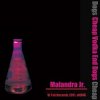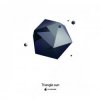
“Infinity” («Инфинити») — a Russian pop group known for melodic dance tracks that blend heartfelt lyrics with a club-ready sound. Formed at the turn of the era — in the late 1990s — the act kept listeners’ attention for many years thanks to a distinctive vocal style, modern production, and a romantic aesthetic.
Early years and formation
The story begins in 1999, when singer Tatyana Bondarenko (stage name Malta) and sound producer Aleksey Kutuzov teamed up under the name “Black and White”. Tatyana performed her own songs while Aleksey handled the arrangements.
By the early 2000s, the project had shaped a signature style — gentle electronic pop music with lyrical themes. In 2002, they created the track “Gde ty” (“Where Are You”), though at the time it didn’t receive wide recognition.
Transition period and collaboration
From 2002 to 2006, the project collaborated with Novosibirsk’s D.I.P. Project. Music producers Denis Murzin and Dmitry Brezhnev refreshed the arrangements, strengthened the electronic component, and helped the songs gain a contemporary sheen.
This stretch is considered the moment when the future Infinity sound truly took shape.
Renaming and concept
In 2006, the group adopted the name “Infinity” (from infinity — “endlessness”). As Tatyana put it, the team had “grown up” and started treating music more deliberately:
“Our songs grew out of us and scattered across the world, which means we’re creating for a reason.”
At the same time, they presented the album “Once and for All”, which became popular online, while the track “I’m a Stranger” emerged as one of their first unexpected hits.
Breakthrough and mainstream success
In 2007, Infinity signed with Gala Records, a major Russian label. The single “Gde ty” was reissued and updated, suddenly becoming:
-
a major radio hit,
-
a staple in clubs,
-
one of the most heavily rotated songs of the year.
The track entered rotation on DFM and many national stations. Digital sales surpassed 1 million, earning the project gold status.
Creative upswing
The collaboration with D.I.P. Project continued: the studio was technically upgraded with analog synthesizers and hardware effects. This gave Infinity a signature sound built on:
-
deep basslines,
-
atmospheric synths,
-
lyrical drama.
During this period they recorded:
-
“Movement of Water”
-
“We’re Flying”
-
“Stereolove”
-
“Non-Stop”
-
two new versions of “Gde ty”
-
the ballads “Silent Tear” and “My Story”
Charts and awards
In 2008, the group received the Golden Gramophone for “Gde ty” and was nominated at the RMA in the “Dance” category.
In 2009, “Slyozy-voda” (“Tears-Water”) became a radio hit, reaching No. 13 on Russian charts and earning a gold disc (100,000 copies sold).
The group was also nominated as “Duo of the Year” at the Muz-TV Awards.
The album “I Want It So Much”
The record climbed to No. 12 on Russia’s album chart. Critics highlighted:
-
a recognizable sonic identity,
-
well-crafted melodies,
-
a broadened stylistic range.
Positive reviews appeared across leading media platforms.
Songs in rotation
By mid-2010, the single “When You Leave” reached No. 15 on the radio chart, cementing Infinity’s popularity.
In total, the group has released around 30 titles, with highlights including:
-
“I’m a Stranger”
-
“Gde ty”
-
“Silent Tear”
-
“Tears-Water”
-
“Non-Stop”
Style and stage aesthetic
Infinity combines:
-
dancefloor-friendly club rhythms,
-
musicality and gentle melancholy,
-
pop harmonies,
-
airy female vocals.
Their live shows are marked by:
-
emotional commitment,
-
vibrant energy,
-
a dense, polished sound,
-
DJ-driven elements.
Today
The group remains in demand at:
-
festivals,
-
club concerts,
-
city events,
-
retro-dance radio rotations.
Their 2000s songs are increasingly viewed as “nostalgic hits,” while continuing to find new audiences on streaming platforms.
Fun facts
-
Many tracks went viral online long before the TikTok era.
-
“Gde ty” was used in fashionable nightclubs as a “go-to dance anthem.”
-
Tatyana Bondarenko’s musical education shapes the quality of the melodic writing.
-
Listeners often cite Infinity as one of the projects that helped bring back the popularity of female club vocals in Russia.
-
Their songs became staples of “driver-friendly” radio formats.
Conclusion
Infinity is a striking example of a homegrown electronic pop act that united club energy, romantic lyrics, and a recognizable vocal signature. The group traveled from an experimental studio project to major awards, establishing itself as a consistent supplier of radio hits.
Their music has stood the test of time, appealing to audiences who want both danceability and sincere melody. That combination makes Infinity one of the notable names in Russian pop-electronica of the 21st century.
















